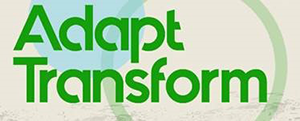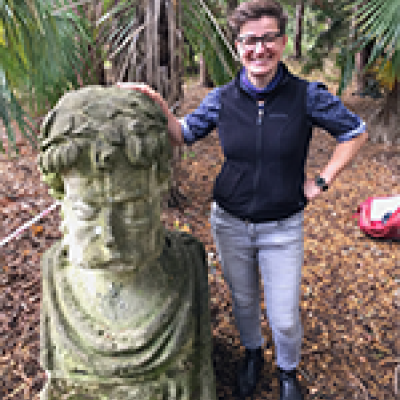Dr Katrin Wilhelm
Researcher and Departmental Lecturer
Senior Common Room member at St Antony's College
Member and co-lead of the OxRBL
Member of the Equality, Diversity and Inclusion Committee
Member of the Fixed Term Researcher Forum
Researcher and Departmental Lecturer
Senior Common Room member at St Antony's College
Member and co-lead of the OxRBL
Member of the Equality, Diversity and Inclusion Committee
Member of the Fixed Term Researcher Forum
Academic Profile
Katrin Wilhelm, an interdisciplinary early career researcher, uniquely combines her experience as a first-generation academic, former stonemason, and DPhil graduate from the Oxford Resilient Buildings and Landscapes Lab (OxRBL)—which she currently co-leads with Prof Viles. Her transdisciplinary approach integrates physical, engineering, social, environmental, and digital sciences to advance historic natural and cultural environments, as well as heritage sciences.
Katrin's research portfolio demonstrates how integrating heritage sciences across Geography's varied domains can foster innovative research and teaching, enabling culture as a catalyst for climate action and resilient futures.
Katrin obtained her diploma in restoration, art technology and heritage science from the Technical University Munich (TUM) and her DPhil from the University of Oxford. Before her academic career, she worked as a trained stonemason and as a site manager for heritage site conservation. Her DPhil thesis focused on improving non-destructive techniques for stone weathering research in situ.
Katrin is currently engaged in supervising undergraduate and graduate research in physical, environmental and heritage geographies, as well as delivering undergraduate teaching. She also has a passion for outreach and engagement and has led several highly successful public-facing projects in physical geography and heritage science. She sits on the university Heritage Network steering committee under the Climate Heritage Network and is a member of the (En)Coding Heritage Network.
Katrin aims to understand how the historic environment can afford more of a 'service' to society in view of present challenges. To realise these services in a tangible way she is following the principle: "local action for global traction". Her heritage research portfolio explores, formalises, and enhances 'historic environment system services' pursuing three uniquely interlinked themes:
- Learning from the past to thrive in the future:
- Improving the World's Built Heritage Conservation: Understanding physical weathering processes under increased environmental pressures, climate change, and the resilience of materials including protective biota to inform sustainable future conservation approaches; advancing economical methods such as the "Lab in your pocket";
- Oxford's stone-built heritage as a proxy for historical air quality (OPAQ) Establishing urban built heritage as a cost-effective geochemical archive for past and present air pollution, including microplastics. The collaborative OPAQ project links urban heritage and public health to inform the development of healthy and sustainable cities;
- Innovative materials and engineering: Harnessing ancient materials like Roman 'concrete' and Petra's water management system, to inform sustainable infrastructure design and sustainable materials for a low-carbon future. Investigating ancient building materials and technologies, reveals untapped knowledge that can guide sustainable conservation efforts and future materials.
- Working with nature: Nature-based solutions in heritage environments: This theme fosters synergies between 'nature' and 'culture' for resilience and sustainability. It examines biota's bio-protective functions for historic environments linking to the first theme. Further, the Urban Bio-Labs project, involving interdisciplinary teams and non-academic partners, explores plant-based public engagement with urban heritage. Finally, Katrin co-leads the international SXNCH network, synchronizing knowledge and diversifying participation to enhance historic environment management and support thriving communities and heritage.
- Learning with the people: Human-based solutions: This theme focuses on the 'human factor' in historic environment systems through three key projects. Under 'Smart Urban Culture', Katrin leads the Lab-In-Your-Pocket project, which connects digital technology and historic environments to increase environmental, health and digital literacies, transforming smartphones from 'toys' to 'tools'. The project has two strands: developing Citizen Science tools for diverse public heritage spaces and formalizing mobile technology research methods in Higher Education. Additionally, the Tomorrow's Oxford Heads project, a collaboration with the History of Science Museum, funded by the University's Diversity Fund pioneered efforts aimed at diversifying public sculpture, aimed to enhance the visibility of women and underrepresented groups in the University of Oxford in its externally facing public sculpture. This project was short-listed for the VC Diversity award.
In recent years, Katrin has carried out field-based research in many places in the UK and Germany, as well as in Italy, Turkey, and Jordan.
Current Research
BHRI - P2 (Built Heritage Research Initiative - Phase 2): Sandstone Conservation
Katrin works in a collaboration between OxRBL (the Oxford Resilient Buildings and Landscapes Lab) at the University of Oxford and the Getty Conservation Institute. The project aims to develop a robust, multi-method approach for evaluating conservation treatments for sandstone.
OPAQ - Oxford's stone-built heritage as a proxy for historical air quality
Katrin leads a transdisciplinary, collaborative project with Dr Jack Longman (University of Northumbria), Dr Chris Standish (University of Southampton), Neil Young and Phani Karamched (David Cockayne Centre, Department of Materials, University of Oxford), Michelle Jackson and Dania Albini (Zoology, University of Oxford), Josep Grau-Bove and Miriam Wright (Institute for Sustainable Heritage, UCL) and Tim de Kock (University of Antwerp) funded by a SoGE Inspiration Fund and the John Fell Fund. This study advances air pollution research by telling the time on the 'pollution clock' preserved in black crusts and thus, established urban stone-built heritage as an economical long-term geochemical archive for past and presents air pollution including microplastics.
Lab-In-Your-Pocket - Utilising Smartphones for Heritage Teaching and Citizen Science & Science Communication
Katrin leads the Lab-In-Your-Pocket an ongoing research project based at Oxford's School of Geography and the Environment which is further supported by the Oxford Resilient Buildings and Landscapes Lab (OxRBL). It is divided into two strands; one which addresses the untapped potential for formalising research methods around mobile technologies in Higher Education, and another which looks towards developing citizen science tools for diversifying public heritage spaces through digital engagements.
'SXNCH' - "Synchronising Knowledge, Diversifying Participation and Building Resilience for Sites at the Intersection of Natural and Cultural Heritage"
Katrin co-leads SXNCH, a globally engaged research group and growing network, based at the University of Oxford, focused on understanding the intersection of cultural and natural heritage. The aim is to better understand sites at the intersection of cultural and natural heritage by bringing together researchers, experts, local leaders, communities, decision makers, worldwide, promoting shared learning and collaborative problem-solving.
SXNCH aims to enhance historic environment management and foster sustainable opportunities for communities and heritage to thrive together.
Urban BioLabs - Engaging Publics with Urban Heritage through Plants
The Urban Bio-Labs project brings together an interdisciplinary team of researchers from the Open University and the University of Oxford with non-academic partners from the heritage (Oxford Preservation Trust) and art-science sectors (Artecology) to explore how plants can be a vehicle for renewing public engagement with urban heritage and its futures. Building on our academic research base, the project aims to strengthen on-going collaborative relationships with the partners through knowledge exchange and develop impactful engagement activities under the theme of built heritage-plant interactions.
Petra (Jordan): Concept Development for an Education and Training Programme in the Field of Cultural Heritage
Katrin is co-lead in a collaborative project with the Fraunhofer Centre for International Management and Knowledge Economy, the Fraunhofer Institute for Building Physics, and Dr Martin Michette (OxRBL) funded by the German Foreign Office. The main aim of the project is to develop a concept for an Education and Training Programme in the Field of Cultural Heritage in Petra, Jordan (in response to Covid-19 focussing on digital literacy and virtual networking at the moment).
Arch & Lab Pompeii - Restoration Archive and Exposition Laboratory
Katrin was involved in the project management, coordination and research of this highly interdisciplinary project which contributes to sustainable heritage. The cooperation between the Max-Planck Institute for Art History and Florence and the Fraunhofer Institute for Building Physics, Munich (Holzkirchen) combined expertise in technical-science, art history and perception. The project addressed both Pompeii's tangible and intangible conservation history, perception and preservation, as an inseparable part of its holistic legacy. The contributions informed heritage material science (best long-term outdoor performance) and sustainable understanding of Pompeii as a place of transnational, European history and culture.
Head Hunting: 350 years History and Mysteries of Oxford's Stone Heads
Karin is lead on this interdisciplinary project which contributes to Oxford's local history and Heritage Science. The project features the 13 carved busts (and their preceding two generations retired in Oxford's private and college gardens) that ring the perimeter of the Sheldonian Theatre and the History of Science Museum, which are an iconic feature of Oxford - yet, a great deal of mystery surrounds them. The project unravels the history and mysteries of the Heads as a unique 350-year record of urban architectural decay, conservation, environmental change, and changing attitudes and perceptions. This project inspired the Tomorrow's Oxford Heads project and the OPAQ - Oxford's stone-built heritage as a proxy for historical air quality project. This shows the project's implications for sustainable management of built heritage, collective memory, and identity.
#FindTheHeads
Tomorrow's Oxford Heads (TOH)
Katrin was co-lead on this collaborative project with the History of Science Museum and with the financial support of the University's Diversity Fund. This project worked in conjunction with the History and Mysteries of Oxford's Stone Heads project, which addresses the past and present of the stone Heads, whereas the TOH explores what the future might hold for these Heads. The TOH project was a pioneering project which addressed the question: 'How can we diversify public sculpture to better represent the people in today's University of Oxford?' The project aimed to enhance the visibility of women and underrepresented groups in the University of Oxford in its externally facing public sculpture. It built upon the successful 'Diversifying Portraiture at Oxford Project' which commissioned 21 portraits of diverse current and former, staff and students. The responses to the two TOH's temporary artworks were overwhelmingly positive and demonstrated successfully how temporary, artistic interventions can add value and new meanings to public space and provoke stimulating discussions about diversifying the University's external image.
Syrian Stonemasonry Training Scheme project
Katrin has been involved as an advisor in the collaborative project between the British Council, the World Monument Fund and the Petra National Trust. The project trained female and male Jordanian locals and Syrian refugees in traditional stonemasonry skills to equip them with the ability to work on conflict-affected built heritage.
Funding and awards
- 2023 Teaching Development and Enhancement Project Award (TDEP): Digital tools for Heritage Students: Using the ‘Lab-in-Your-Pocket’ toolkit to support an innovative Heritage training programme and improve Digital Literacies
- 2022 ESRC IAA (stage 2) Kickstarting SXNCH-2: Co-producing a platform and an agenda for Sites at the Intersection of Natural and Cultural Heritage
- 2022 Teaching Development and Enhancement Project Award to develop the Lab-In-Your-Pocket to unlock the untapped potential for formalising research methods around mobile technologies (incl. smartphones) in Higher Education and developing Citizen Science tools
- 2021 2022 MPLS AWS: Human Machine Collaboration Initiative-EdTech-4 test bed: Lab-In-Your-Pocket
- 2021 ESRC IAA (stage 3) Urban BioLabs to develop methodologies for engaging (underrepresented) publics with (neglected) urban heritage through (spontaneous) plants
- 2021 KE Seed Fund to explore how Oxford University researchers can help Winchester Cathedral conserve and engage visitors with medieval tiles and 17th century globes
- 2021 German Foreign Office award for phase 2 of the Petra project to realise the Concept Development for an Education and Training Programme in the Field of Cultural Heritage in Petra, Jordan
- 2021 Social Sciences Engagement Fellowship (HEIF funded). Board member to develop an agenda for sustainable heritage conservation together with the English Heritage Trust
- 2020 University of Oxford Fell Fund in collaboration with Dr Jack Longman (University of Northumbria) and Dr Tim de Kock (University of Antwerp) for "Telling the time on the 'pollution clock' preserved in black crusts: Urban stone-built heritage as an economical long-term geochemical archive".
- 2020 German Foreign Office award in collaboration with the Fraunhofer Centre for International Management and Knowledge Economy, the Fraunhofer Institute for Building Physics, and Dr Martin Michette for Concept Development for an Education and Training Programme in the Field of Cultural Heritage in Petra, Jordan
- 2019 SoGE Inspiration Award in collaboration with Dr Jack Longman and Dr Scott Allan Orr for Oxford's stone-built heritage as a proxy for historical air quality
- 2018 Oxford University Diversity Fund award for Tomorrow's Oxford Heads project in collaboration with the History of Science Museum Oxford
- 2017 SoGE Inspiration Award in collaboration with Dr Martin Coombes for The History and Mysteries of Oxford's Stone Heads project
- 2013 EPSRC (Engineering and Physical Sciences Research Council) studentship grant
- 2013 DAAD doctoral research grant
- 2012-2015 Proceq® research grant
Teaching and Supervision
Dr Wilhelm contributes to the Heritage Science option and Geographical Techniques (Methods in Physical Geography) course and respective field trips. Further, she supervised work experience students, a Nuffield funded student, BA and MA theses and PhD theses. She takes part in admission interviews and organised the UNIQ summerschool field day. She is also part of the team to implement changes for the integrated methods course.
Outreach

The Lab-In-Your-Pocket has teamed up with the Polar Academy to infuse their student field trip with mobile science.

The Tomorrow's Oxford Heads - Diversifying Public Sculpture project and the Lab-In-Your-Pocket will feature in the Adapt-Transform exhibition at the Modern Art Oxford and Brookes University.

With a team she established the SEED (Speedy Expertise Exchange & Discussion) talks in 2015 which showcases the breadth of research going on in the School of Geography and the Environment.





